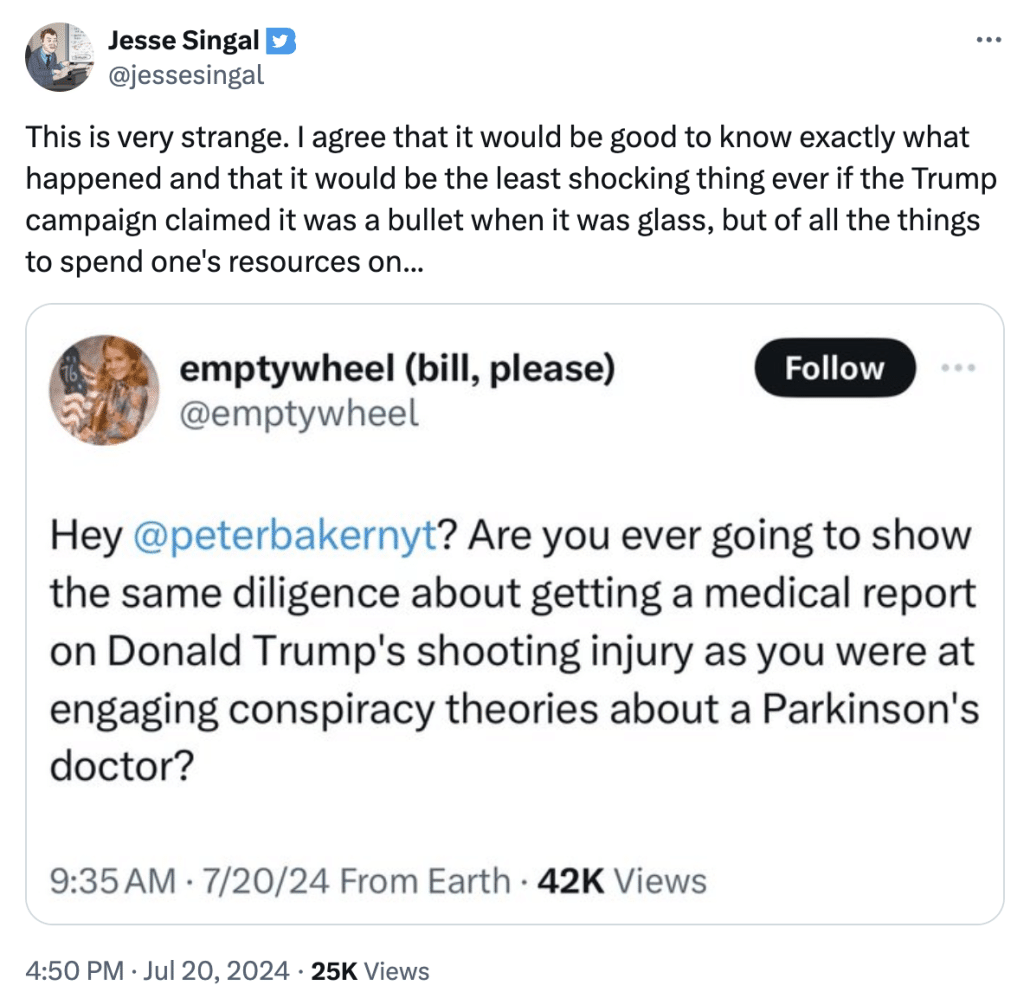Something funny happened on Xitter.
In an attempt to demonstrate the double standard and cowardice of the captive media, I tweeted at Peter Baker asking if he was ever going to exercise the same diligence about getting a medical report on Donald Trump’s shooting injury as he was at engaging in conspiracy theories about a Parkinson’s doctor.
Jesse Singal screen capped the tweet, admitted “it would be good to know exactly what happened” but then scolded that my single tweet was a weird thing, “to spend one’s resources on…”
Singal babbled on in telling ways, if you’re into that kind of thing.
But his complaint is useful illustration of something larger.
Given replays, I have no reason to doubt that the teleprompters were not hit by any bullets Thomas Crooks shot; I accept that early reports that Trump was hit by glass from his teleprompter were wrong.
I have no preconception about what we would learn from a medical report on the treatment Trump got. It might be something as banal as the news that plastic surgeons had to do some quick reconstruction to replace cartilage in Trump’s ear. Though Eric Trump has already revealed that Trump did not require stitches, which is the most detailed report we’ve gotten.
What I do know is there once used to be a norm in the United States that presidents and presidential candidates were expected to offer some transparency, however feigned, about two subjects: their finances and their health.
Biden has done that. Indeed, the report he released from his January physical not only described that he had been screened for Parkinson’s, which was ruled out, but it provided explanations for the things, like his halting step, that had raised concerns about Parkinson’s. Sure, by all means question that — but before you do, at least cross check the visitor logs on which you’ve built a conspiracy theory to see if they back your insinuations (which these never did).
Biden has similarly released several reports about the progression of his COVID, down to his temperature, treatment, and oximeter levels (one, two, three). Given the current state of COVID treatment, I have no big worries about his diagnosis (just as I have no preconceived notion about what Trump’s medical treatment would reveal). But it’s good to have. It is an important part of democracy. At the very least, such reports offer reassurances that if something were to happen — such as the time Trump got pre-vaccination COVID and almost killed Chris Christie, before walking into a debate with Joe Biden — we would know about it.
Obviously, we never got anything remotely reliable as to Trump’s medical records. He had two hack doctors write up his reports, one of whom disclosed alarming details about a cover-up after the fact. He had at least one medical event that remains unexplained.
And so, even if Trump’s entire right ear had been replaced, I doubt we’d know about it.
But, particularly amidst an otherwise diligent effort to learn what happened, I would expect that journalists would nevertheless demand such reports. If Trump refused to provide such reports, I would expect that to be a story — certainly a far bigger story than Peter Baker’s baseless insinuations about Biden’s health.
And yet, crickets. Either they asked and were refused that basic information, or they have stopped bothering to ask for basic transparency from Trump, knowing he’ll refuse.
Either way, the failure to demand a formal medical report after a shooting attempt represents the utter collapse of the most basic kind of journalism.
Do not obey in advance, Tim Snyder has written about how to resist fascism.
Ask for the medical report, even if you know they’ll refuse. If they do refuse, that — by itself — is a story.
Update: Shortly after I posted this, Trump released what purports to be a medical report from Candy Man Ronny Jackson.
It serves as an excellent test of whether self-imagined journalists are exercising any assessment of source credibility. More on this tomorrow.
